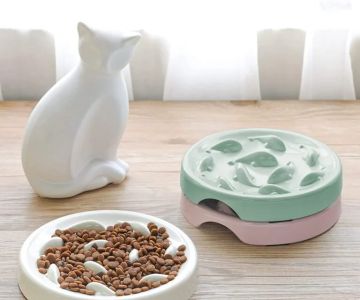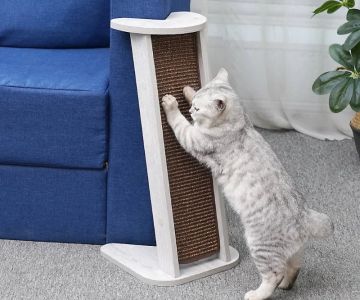
- What is Deworming?
- Why is Deworming Important for Kittens?
- Kitten Deworming Schedule
- Signs That Your Kitten Needs Deworming
- Best Deworming Products for Kittens
What is Deworming?
Deworming is the process of eliminating intestinal parasites, such as roundworms, hookworms, and tapeworms, from your kitten’s body. These parasites are common in young kittens and can cause a range of health issues if left untreated. Regular deworming is crucial for your kitten's well-being, ensuring that they grow healthy and strong.
Why is Deworming Important for Kittens?
Kittens are particularly vulnerable to parasitic infections because their immune systems are still developing. Deworming ensures that any intestinal worms are cleared from their system, preventing complications like malnutrition, anemia, and stunted growth. Without treatment, worms can cause your kitten to suffer from poor digestion, vomiting, diarrhea, and a weakened immune system.

Nassau-Suffolk Animal Hospital
FarmingdaleNassau CountyNew York
27 Conklin St, Farmingdale, NY 11735, USA
Kitten Deworming Schedule
Establishing a proper deworming schedule is essential for keeping your kitten healthy. Here’s a general timeline that is recommended by veterinarians:
1.1 Deworming in the First Few Weeks
Most veterinarians recommend deworming your kitten at 2, 4, 6, and 8 weeks of age. At these early stages, kittens are more likely to contract worms from their mother or the environment. Deworming at these intervals helps reduce the risk of parasitic infections as your kitten’s immune system matures.
1.2 After 8 Weeks of Age
After your kitten reaches 8 weeks of age, they should receive their first round of vaccinations. It’s important to deworm them again at this stage to ensure they’re parasite-free before their first vaccine. Most kittens will need deworming every three to four weeks until they’re about 16 weeks old, at which point you can transition to a more adult deworming schedule.
1.3 Ongoing Deworming After 6 Months
Once your kitten reaches six months of age, they can begin to follow an adult deworming schedule. This typically involves deworming every 3-6 months, but your veterinarian will guide you based on your kitten’s health and lifestyle.
Signs That Your Kitten Needs Deworming
Some kittens may exhibit symptoms of a parasitic infection. Here are common signs that your kitten may need deworming:
2.1 Vomiting
Frequent vomiting, especially with visible worms, is a clear indication that your kitten needs deworming. Sometimes, the worms may appear in your kitten’s feces as well.
2.2 Diarrhea
Diarrhea, particularly if it’s accompanied by blood or mucus, can be a sign of an intestinal infection caused by worms. If your kitten’s diarrhea persists, a deworming treatment may be needed.
2.3 Lethargy and Poor Appetite
If your kitten seems unusually tired or refuses to eat, it could be a result of an underlying parasitic infection. Worms can cause significant discomfort and prevent your kitten from feeling energetic or hungry.
2.4 Visible Worms
If you notice worms around your kitten’s anus or in their feces, it’s time to deworm. Roundworms, for example, can be visible to the naked eye and may appear as small, spaghetti-like strands.
Best Deworming Products for Kittens
There are many deworming products available on the market, but it’s important to choose one that is safe and effective for kittens. Some of the top-rated deworming products for kittens include:
3.1 Pyrantel Pamoate
This is a common over-the-counter dewormer that is effective against roundworms and hookworms. It is generally safe for kittens and can be administered as a liquid or tablet.
3.2 Praziquantel
Praziquantel is a broad-spectrum dewormer that treats tapeworms as well as some other types of parasites. It’s available in both oral and injectable forms.
3.3 Combo Dewormers
Some products combine multiple deworming agents to target a broader range of parasites. These combination dewormers can be particularly useful if your kitten is at risk for multiple types of worms.
For the best selection of deworming products and advice on kitten care, visit Omnia Pet to find the right options for your kitten’s health.








 Secondhand Pet Supply4.0 (27 reviews)
Secondhand Pet Supply4.0 (27 reviews) Petco4.0 (1872 reviews)
Petco4.0 (1872 reviews) BRM EXOTICS EXPO4.0 (130 reviews)
BRM EXOTICS EXPO4.0 (130 reviews) Pet Supplies Plus Clearwater4.0 (2116 reviews)
Pet Supplies Plus Clearwater4.0 (2116 reviews) Veterinary Emergency Group4.0 (750 reviews)
Veterinary Emergency Group4.0 (750 reviews) Puppy Avenue3.0 (420 reviews)
Puppy Avenue3.0 (420 reviews) Why Do Kittens Like to Play in Empty Boxes? Uncover the Fun and Fascination
Why Do Kittens Like to Play in Empty Boxes? Uncover the Fun and Fascination Pet Funeral and Grieving: How to Cope with the Loss of a Beloved Animal
Pet Funeral and Grieving: How to Cope with the Loss of a Beloved Animal How to Keep Your Pet Calm During a Thunderstorm or Hurricane
How to Keep Your Pet Calm During a Thunderstorm or Hurricane Understanding Kitten Spay: Laparoscopic vs. Traditional Procedures
Understanding Kitten Spay: Laparoscopic vs. Traditional Procedures The Top 10 Most Popular Kitten Names of 2024
The Top 10 Most Popular Kitten Names of 2024 The Best Diet for a Russian Blue Kitten's Shiny Coat
The Best Diet for a Russian Blue Kitten's Shiny Coat